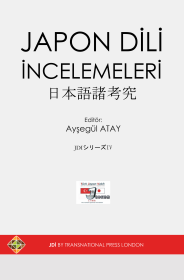Japoncada Fiil İstemi Ve Türk Öğrencilere “İsim+Ni+Fiil” Yapılarının Öğretimi Üzerine
Japanese Verb Valence System and Teaching “Noun+ni+Verb” Structure to Turkish Native Speakers
Author(s): Zeynep Gençer
Subject(s): Language studies, Education, Foreign languages learning
Published by: Transnational Press London
Keywords: Japanese education; case particle; verb valance; actionosart; aspect;
Summary/Abstract: In traditional school grammars of Modern Turkish, the case markers are generally listed as nominal category but recently we see that some researchers started to use term “valence” for these kind of markers. With these studies, the markers such as “+Ø, +I, +A, +DA, +DAn” have begun to be addressed again. Researchers started to discuss again that in which circumtances they are connected to the noun (binding theory) and how the verb dominates the noun (governing theory). In this paper, we will discuss Turkish native speakers’ learning problems about Japanese marker “ni” and learner's mistakes that are caused by the similarities between the mother tongue and the target language. We selected “Minna no Nihongo Shokyu I” as the study material. First of all, we introduced the “noun+ni+iru/aru” structure and described the actionsart function of main verb iru/aru. Secondly, we tried to put forth the relation between the structure “noun+ni+verb” and the structure “noun+ni+iru/aru”. After giving theoretical back ground, we picked the up verbs that combine with the marker “ni” and we analysed their facilities through binding and governing theories. According to our analysis we figured out that while teaching “noun+ni+verb” constructions teachers should a) teach the structure as a phrase not only as a marker b) take “ni” as a verb valence not as a suffix c) explain the importance of verb valence and aspectual value of the sentence to the learners.
Book: Japon Dili İncelemeleri / 日本語諸考究
- Page Range: 103-114
- Page Count: 12
- Publication Year: 2018
- Language: Turkish
- Content File-PDF

